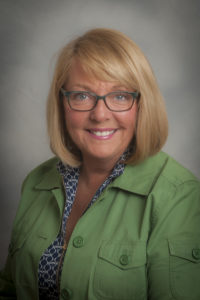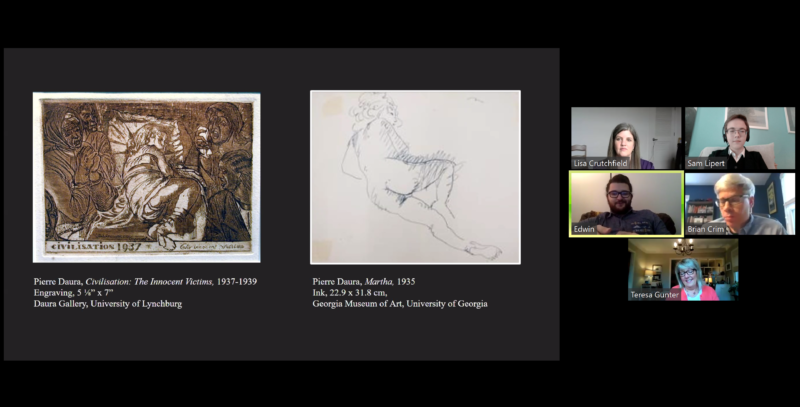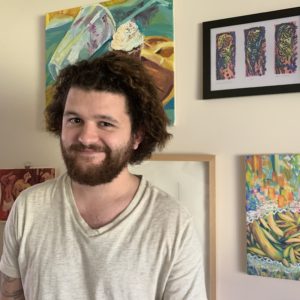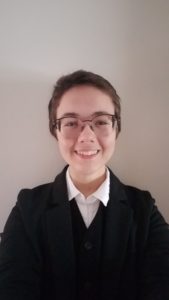Social distancing didn’t keep four University of Lynchburg history majors from participating in the Phi Alpha Theta National History Honor Society regional conference on March 27 — and it also didn’t keep one of them from taking the virtual meeting’s top prize.
At the conference, held online due to the COVID-19 pandemic, Teresa Gunter ’20 took first prize for her paper, “An American Story: Pierre Daura as a Refugee, Immigrant, and Naturalized Citizen.” Daura taught art at Lynchburg College in the 1940s and is the namesake of the University’s art gallery.

Gunter, a Westover Honors fellow and Access student with a minor in museum studies, became interested in Daura and his story while working on a 2019 Daura Gallery exhibit, “The Rockbridge Group: Masters Along the Maury,” which included work by the Catalan painter.
“Something curious in the background of Pierre Daura caught my eye,” Gunter said. “On the surface, Daura seemed like a man who led a quiet life. He was well-connected and highly regarded as an artist and man of outstanding character and devotion to his family.”
Conversely, Gunter also found Daura to be a man of intrigue. “As an artist in Paris during the ’20s and ’30s, he naturally associated with people of all sorts of left-leaning political affiliations,” Gunter said. “He joined the Socialist Workers Party and the National Confederation of Workers in 1936, about a year before he volunteered in the Spanish Civil War.”
Daura designed the cover of a book written by the first leader of the U.S. Communist Party and was friendly with a political activist who was punished during America’s second Red Scare. Despite these connections, which would have been deemed “subversive” by the U.S., Daura easily entered the country in 1937.
Gunter said more research needs to be done to determine how much Daura concealed about his leftist politics in order to gain American citizenship.
Gunter’s presentation about Daura was the third she’d made at a conference. Last fall, she and other museum studies minors who had worked on the “Rockbridge Group” exhibit traveled to Charleston, South Carolina, where they presented at the Southeast Museum Conference.
Gunter also has presented at the Virginia Social Science Association Conference, held at the University of Lynchburg. “That experience taught me to up my presentation game,” she said.

At the Phi Alpha Theta conference, history major Edwin Gleason ’21 presented his research about the alliance that existed between American colonists and the French during the American Revolution. He said his interest in early American history began on childhood trips to historic sites — Mount Vernon, the Liberty Bell, and others.
“I became a history major because American history has always been a strong passion of mine,” Gleason, who plans to be a high school history teacher, said. “The professors at the University of Lynchburg have further increased my interest in history in other parts of the world.
“Since I’ve been at the University, I’ve been able to dive further into American history, but also expand on other historical areas, like contemporary Africa and 20-century Europe.”

Despite being a little nervous — it was his first conference presentation — Gleason said he “found the environment of it all to be rather relaxed.” He noticed students just like him “wanting to present their research to like-minded history majors,” and said, “I found it to be helpful. After presenting, I was given tips about other authors that could help further develop my research.”
Christine Moore’s paper, which she wrote for her senior thesis in history, focused on the perception of the Vietnam War and its veterans. “[It’s] about how the Vietnam War is presented in a very stereotypical way: drafted men, in the Army, that have PTSD, [and] that have little to no connection to life in the States,” Moore said.
“But war is a personal story, so I wanted more historians to go out and make connections with Vietnam vets, to get a more complex and true historiography of the time. This interested me because I got to do a case study of my grandfather and really learn about a war that I didn’t know much about through his eyes and other research.”
Moore said she and the other students also received a lot of support from faculty. “The faculty in the history department are amazing,” she said. “They are such great supporters and mentors. They are people you can have deeper conversations with about politics or life, and they … really want to see you blossom and succeed.”
As a freshman, Sam Lipert ’23 didn’t present at the conference, but welcomed the opportunity to learn from the experience. “The Phi Alpha Theta conference was my first conference of the academic type,” Lipert said. “It was a lot of fun despite not being in person.

“I was able to listen to and interact with [the] different speakers, and I learned about topics ranging from slave rebellions in Virginia to the Democratic primaries of 1968. I learned a lot about the history presented on, as well as different methods of presentation that can be used with history papers.”
Assistant Professor of History Dr. Lisa Crutchfield, who worked closely with the students on their presentations, commended them for “their hard work, dedication, and good humor” during what has been a challenging and disruptive time.
She added, “I’m delighted to say they all represented the University of Lynchburg extremely well. Not only did they have interesting projects to share, their presentations were practiced and polished, and they thoughtfully engaged in conversations with other students and faculty.”
Crutchfield also thanked her colleagues at Lynchburg, including Dr. Adam Dean, Turner Distinguished Chair in Humanities. Had the group been able to travel to Marymount University, which hosted the conference, they would have done so with support from the Turner Fund.
“Thanks also to Dr. Brian Crim for being present at the conference and cheering us on,” Crutchfield said of her History Department colleague. “Much gratitude goes to all of the history faculty for working with the students on these projects and indeed to all faculty for supporting their endeavors every day.”

